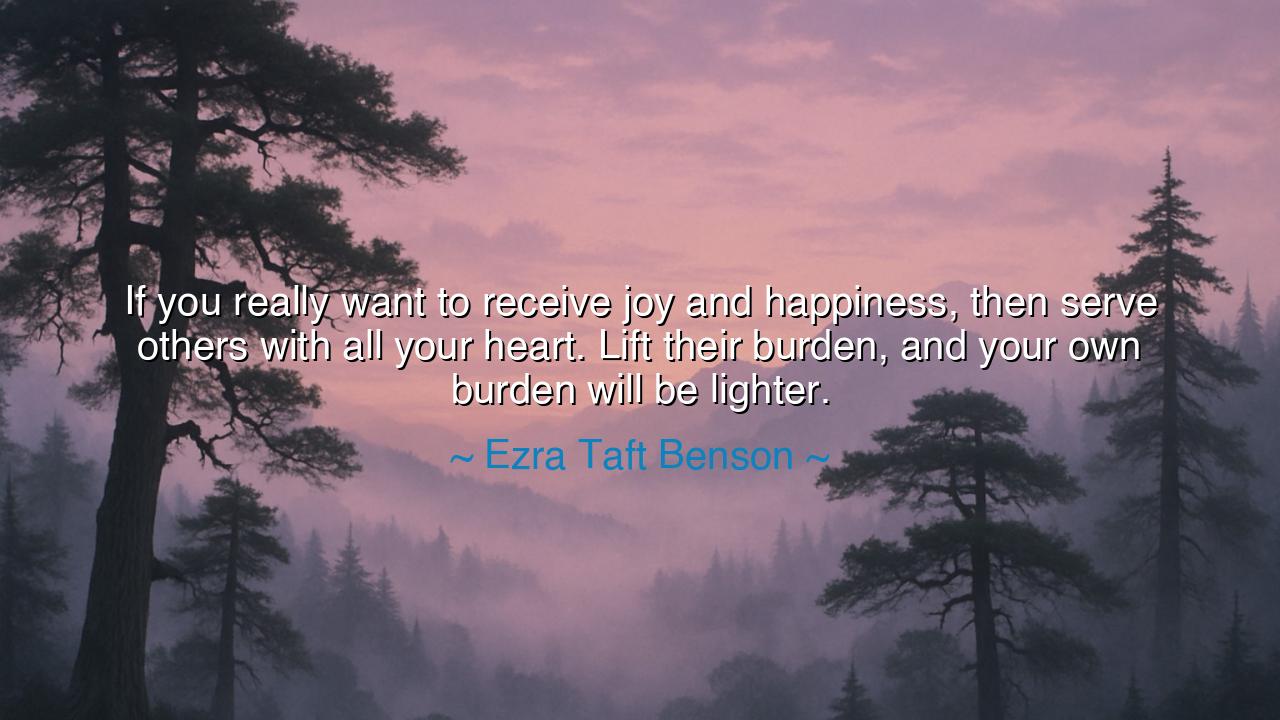
If you really want to receive joy and happiness, then serve
If you really want to receive joy and happiness, then serve others with all your heart. Lift their burden, and your own burden will be lighter.






When Ezra Taft Benson, a man of deep faith and leadership, declared, “If you really want to receive joy and happiness, then serve others with all your heart. Lift their burden, and your own burden will be lighter,” he was revealing a timeless law of the soul — that happiness is not something seized by the self, but something born in the giving of oneself. His words are not mere counsel for good manners or social duty; they are a sacred key to inner peace. For service is the purest form of love, and in lifting another, one finds that the soul itself begins to rise.
In these few lines, Benson captures a truth as old as civilization and as deep as the human heart: that joy and selflessness are intertwined. To live only for oneself is to shrink into the prison of the ego, where every joy fades into emptiness. But to live for others — to comfort, to uplift, to serve — is to awaken the divine spark within. The ancients knew this. The Stoics taught that the wise man serves humanity as the bee serves the hive, finding purpose not in consumption but in contribution. The Buddhists taught karuṇā — compassion — as the path to enlightenment, for when one eases another’s pain, one’s own suffering dissolves. And Christ himself declared, “He that is greatest among you shall be your servant.” Thus, across all ages and faiths, service is not seen as sacrifice but as salvation — the rebirth of the soul through kindness.
Benson, who led both as a statesman and a prophet, lived in an age of prosperity shadowed by selfishness. He saw that wealth, ambition, and comfort often left people hollow. And so, his teaching came as a call to remembrance — that the heart was not made to hoard, but to give. The origin of this wisdom lay in his understanding of the divine order: that man’s greatest fulfillment comes not from taking, but from lifting. In the simple act of helping another — a neighbor in need, a child in sorrow, a stranger in despair — the human spirit experiences its truest form of joy. For joy, as he knew, is not pleasure; it is the soul’s recognition that it has touched eternity.
Consider the example of Florence Nightingale, who left the luxury of her home to tend to the wounded in the filth and chaos of war. Surrounded by death and disease, she could have despaired. Yet she wrote in her letters that she felt a strange peace, a joy unlike any she had known before. Why? Because in serving others, she transcended herself. Her burden, though heavy, became light — for it was carried by love. The same truth lives in the stories of Mother Teresa, Mahatma Gandhi, and countless nameless souls who have found strength in compassion. To lift another’s burden is not to weaken oneself, but to draw from the well of divine strength that flows through all who serve.
There is a paradox at the heart of this teaching — that in giving, we receive; in serving, we are healed. The one who lives only for their own comfort soon grows weary of it. But the one who forgets themselves in the service of another discovers an inexhaustible source of peace. For when we see another smile because of our kindness, or when a burdened heart stands straighter because we helped to carry the load, something in us is restored — the heart remembers its purpose. Happiness, then, is not a reward but a reflection — the echo of love returned to the giver.
To serve with all your heart, as Benson commands, means to give not out of duty, but out of genuine love. It means to see the divine in others — to recognize that every person carries within them a fragment of eternity. When you lift their burdens, you are not merely performing charity; you are participating in the sacred rhythm of creation itself — where every act of kindness ripples outward, light multiplying light. This kind of service does not demand wealth, status, or perfection; it demands only willingness — the open hand, the listening ear, the heart that says, “Here I am.”
So, my listener, remember this: if you seek happiness, do not chase it — give it. If you wish your burdens to be lighter, help another to carry theirs. Seek out the lonely, the weary, the overlooked; offer them not pity, but companionship. Speak kindness where the world is cruel, bring warmth where the world is cold. Every act of love you give will return to you, though not always in the way you expect — for the reward of service is not applause, but peace.
And when your days grow long and your strength wanes, you will look back and see that your truest joys were not the moments you received, but the moments you gave. For as Ezra Taft Benson taught, those who lift others are themselves lifted — their hearts lighter, their souls brighter, their lives filled with the quiet, radiant joy that only selfless love can bring.






AAdministratorAdministrator
Welcome, honored guests. Please leave a comment, we will respond soon